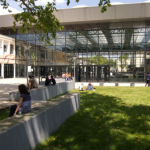Economic Policies in the age of Globalisation (EPOG2) | University of Paris, Sorbonne Paris Nord
EPOG2 is a pluralistic, maintly heterodox programme, between the universities Roma Tre, the Berlin School of economics and law, Sorbonne Paris Nord and Université de Paris. The idea of the programme is to train thinkers and policy-makers able to deal with economic issues (including instability) combined with the related ecological issues.
How does the programme provide content to ensure students achieve an understanding of a reasonably diverse set of perspectives on understanding economies?
By giving a wide range of different views belonging to diverse economic traditions: Post-Keynesian, Marxist, Schumpeterian, ... and also by involving physicists and biologistsBy using different methodologies: modelling (stock-flow consistent, agent-based, economphysics), econometrics and data analysis, litterary and philosophical thinking, ...By insuring a series of research seminars where thinkers or themes that cannot be covered by the programme are dealt with: feminist economics, personal income distribution, modern monetary theory, ....
How does the programme ensure students understand the interaction between economic and ecological systems?
The ecological transition is a core issue of the programme and many courses are dedicated to it: "finance and the ecological transition", "modelling developement and the ecological transition" (given by the French agency for development), "ecological economics", ....These courses are given by specialists of the ecological issues.
How does the programme ensure students understand how to critically explore real-world evidence, both qualitative and quantitative?
Doing economics that seeks to understand the real-world is the common motto of all the courses, with no exception. The vast majority of the teachers and researchers do define themselves as critical realists. People teaching modelling do all agree that it is better to have a model that looks like the real world rather than a most beautiful one. And that these models must not contain silly assumptions, like a natural rate of unemployment or so-called rational expectations.
What pedagogical approaches does the programme use to ensure that students examine the historical context, assumptions and values in all economic thinking?
In each of the lectures, a different theoretical approach is taken, insisting on a different set of economic writings, and on the importance of the various insitututions, historically and geographically.
How does the department ensure that the teaching culture and capacity to deliver economic pluralism are continually improving?
Country:
Various
University:
University of Paris, Sorbonne Paris Nord
Course name:
Economic Policies in the age of Globalisation (EPOG2)
Department/school:
Course level:
Taught Masters
Course language:
English

 all programmes
all programmes